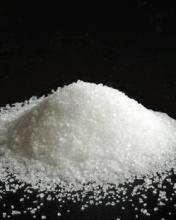MELBOURNE – Reducing salt intake to less than 5 g/day could reduce deaths from cardiovascular disease by 11% and significantly decrease out-of-pocket health expenditures, particularly among economically vulnerable middle-income households, according to a modeling study of South Africa’s salt reduction policy.
The study used surveys and epidemiological data to calculate the potential health and economic impacts of salt targets set by the South African government in 2013, which employs mandatory maximum levels in common processed foods, and public education campaigns to reduce daily salt intake below 5 g by 2020.
According to data presented at the World Congress of Cardiology 2014, achieving this goal would result in an 11% reduction in cardiovascular disease, including approximately 5,600 fewer deaths and 23,000 fewer new cases of cardiovascular disease each year.
"In terms of equity, we found that the health impact was fairly evenly distributed across different socioeconomic groups, which speaks a lot to the myth that cardiovascular diseases are diseases of affluence," said Dr. David Watkins, a hospitalist and physician-researcher at the University of Washington and University of Cape Town.
The modeling, based on a cohort of South African adults, also found the reduction in salt consumption was associated with a $51 million/year reduction in government health subsidies, and a $4 million reduction in individual out-of-pocket expenses, particularly in the middle three income quintiles.
"The financial risk protection from this policy mostly benefitted the middle class because these households pay more for public sector care or seek more costly private care," said Dr. Watkins.
Researchers used the best available data on blood pressure levels, socioeconomic indicators, and health expenditures – in particular out-of-pocket health costs for cardiovascular disease care – and current salt consumption.
"The purpose of this study was to look at the impact of the policy on health and economic outcomes, because a lot of the existing salt literature is focused primarily on reducing deaths – we wanted to look at the broader health system effects," Dr. Watkins said.
Dr. Watkins said the finding of an 11% reduction in cardiovascular disease mortality was fairly consistent with what had been found in other countries, and represented a significant step toward achieving the World Heart Federation goal of a 25% reduction in cardiovascular mortality by 2025.
"We used very conservative estimates of health expenditures, salt intake, blood pressure reduction, and mortality reduction. Despite that, the health and economic effects were quite substantial."
The modeling also showed that much of the reduction in cardiovascular mortality would be in nonischemic hypertensive heart disease, which Dr. Watkins said was driving a significant amount of cardiovascular mortality in South Africa, as well as the rest of sub-Saharan Africa.
The congress was sponsored by the World Heart Federation.
The study was conducted by authors from the Disease Control Priorities Network, which is funded by the Bill and Melinda Gates Foundation. There were no relevant conflicts of interest declared.



